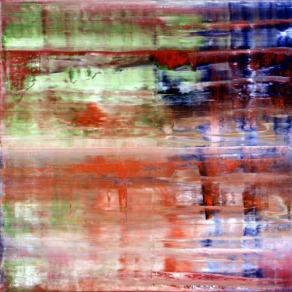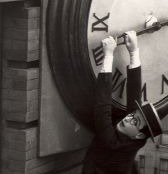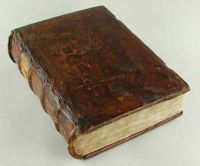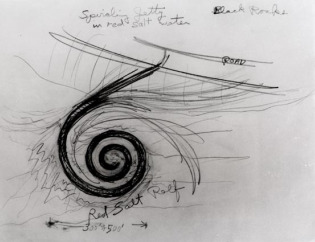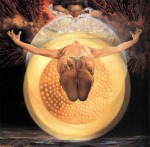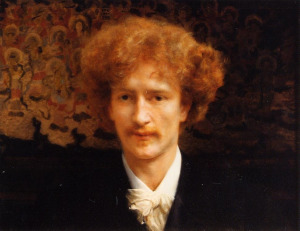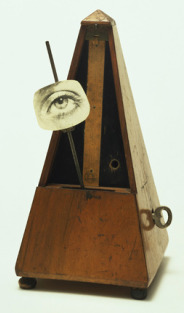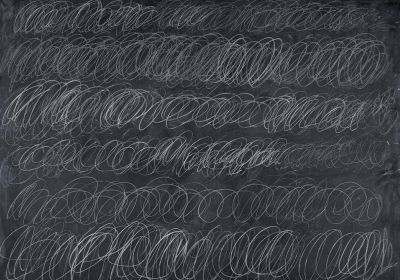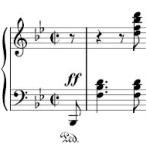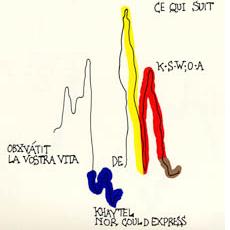Gerhard Richter: Bach (1992) In my dream, J. S. Bach arrives to play on the clavier some of the pieces he's written down, but as he plays, the strangeness of the temperament and lowness of pitch, the flexibility of beat and rhythmic declamation yields some of the things he plays unrecognized, for moments, or even a long while. This music that we own, this familiar canon, under his fingers it is so strange, so far from the received … [Read more...]
Tumbling down
Every performance is an installation, every painting a performance. All poems are music, and every sculpture is a dance. Crayons and brushes are pencil and paper, or computer keyboard, or violin and bow, or space to fill-up on stage in a theater. A pianist is a singer, is a dancer, a maker of line drawings, a teller of tales, a weaver. The designs and stories are new and old. The spinning has never been done before, never … [Read more...]
Extempore
In the Classical music world, it is as if most musicians have forgotten how to talk -- or never learned. They can't communicate with easy ordinary extemporaneous speech. Can't express themselves in daily conversation. Instead, only scripts -- the detailed record, the detailed notation, the traces of music. We are always reading, never speaking for ourselves. Never communicating just what's on our minds or in our hearts. We are mute, unless the … [Read more...]
Just before 8
A few minutes before 8 p.m., my heart beats faster. So many concerts start at this time -- after years in the business my body is trained! The particular ritual of the concert brings a kind of order to living. Concert days culminate in a seventy- or eighty-minute period of time that begins at 8:05, or 8:13 (late ticket buyers still in line). Of course, at Wigmore Hall, this "8 o'clock" is 7:30 (often 7:33), in Rome it's 9. Unlike the … [Read more...]
Case Law
Setting out to learn a piece of scripted classical music, a pianist usually looks at print. Some musicians listen to recordings. A celebrated American violin pedagogue sent her young virtuosos to listen to five or six recordings of a new piece. The kids calculated the speed of each performance with a metronome, averaging the numbers together to determine the right tempo for their own performance -- a focus group for tempo! Other teachers … [Read more...]
Mr. Brendel, thank you
My introduction of Alfred Brendel last night in Boston: In classical music, there are those who believe that thinking about music can compromise feeling -- compromise our emotional response to music. Alfred Brendel's example vividly shows us that such notions are foolish. Mr. Brendel scrutinizes the canonic texts of the piano repertory. He examines the behaviors of piano playing and musical life, and he's shown that deep reflection can yield … [Read more...]
Iowa was the name of the Star
I'm from Iowa. Born there. Grew up there. Studied music there. I wasn't a prodigy. I took lessons from the lady down the street. (Her name was Joy Lord.) In high school, I played concertos with several Iowa orchestras. In a big city, I wouldn't have had the opportunity. I wasn't playing all of Chopin's etudes. Nothing like that. Being there gave me a chance, to dream bigger than I was. What is musical talent? It is an ability to hear and … [Read more...]
Recenter
The "reception" of a piece of music becomes part of its identity. Our performances, recordings, reviews, reactions, lawsuits, teaching, reflection, arrangements, remixes, appropriation -- all of that is the piece, along with the text we started from. Famous music acquires a larger and larger, and more multiply-determined identity. Eventually, there are so many components that none of us can affect the whole very much. When I give the first … [Read more...]
Quality Control
Classical music culture is permeated with judgment making. Maybe it's necessary? Maybe it suits us? We audition musicians to discover who will play better in an orchestra, or to find out which students can develop best in a school. We're always grading and sorting. Critics and conductors announce what pieces are better than other pieces. (Recently, I read about Jean Sibelius's "best" symphony.) It's dangerous. And not because we don't want … [Read more...]
Ascent
There's a certain pride associated with rising melodic lines -- in much nineteenth-century music. Singing soars, and in soaring affirms something very positive about being human. As pitch rises, we might get louder, more tonally intense, more emotional. In other music, high registers are thin. Earlier instruments and techniques may corroborate this thinness: no steel "E" strings on eighteenth-century violins, singing voices differently … [Read more...]
Precedent
Near the beginning of T. S. Eliot's "Portrait of a Lady" there are these lines: "We have been, let us say, to hear the latest Pole Transmit the Preludes, through his hair and fingertips." Were those the celebrated red locks of Paderewski? Like many Poles playing the piano, he specialized in Chopin. There were so many Chopinists in the early years of the twentieth century -- just as sound recording really got going -- that, although we … [Read more...]
Beat It
Walking across the campus of a big Midwestern university, I hear drumming. The drumline from the school's marching band is practicing outdoors, with a very loud metronome. Big speakers blast out the regular electric beats -- quite a lot louder than twenty drummers drumming. These beats sound like gunshots. The music is intricate with a lot of syncopation, and these kids fit it all in, around the clicks. This kind of practicing is not so … [Read more...]
How many?
In an interview recently, I was asked the obvious question: "How many concerts have you played?" And I answered truthfully: "I don't know." I've thought about it before, even wishing I had kept track better. I might calculate the number by studying my old calendars and printed programs. (Could I have notched the leg of a piano bench?) It's got to be hundreds. As I was speculating about this, I asked another question: "For the purpose of this … [Read more...]
One Hand
From the school's library I checked out again the copy of Messiaen's Le merle noir (The Blackbird) that I used last fall when I played the piece with Paula Robison. Since then, many markings were made in the piano part. I don't mark anything in the scores I use, but when I opened the music again there were all the things pianists write: dark circles drawn around printed dynamic markings, fingering, penciled-in lines showing correspondences … [Read more...]
Art is long
Long notes are more important than short notes. Pianists often get confused. Because we don't hold out long-duration tones with bow or breath, it's easy to underestimate their significance. Virtuoso pianists spend so much time attending to what's difficult in virtuoso pieces that it can seem these difficulties -- often passages of short, quick notes -- really are the most important thing in a piece of music. Frequently, it's the other way … [Read more...]

